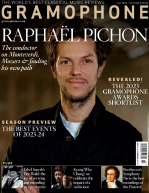Texte paru dans: / Appeared in: |
|
|
Outil de traduction |
|
|
These are, however, no mere identikit refashionings. Bach gathered the seven solo concertos in a tidy autograph manuscript (including a fragment reworking a cantata movement, which Steven Devine has extended into a brilliant concerto reconstruction from BWV35), with as keen an attentiveness to their new context as he showed in his reforging of cantata movements towards the four little Lutheran
Masses. Trying to imagine how such performances were presented is speculative, but doing so helps to decide on an effective and plausible performance practice.
In keeping with most contemporary recordings, single strings accompany the solo harpsichord in a pleasing consort of refined balance. The quintet of the Orchestra of the Age of Enlightenment offers responsive, delicate and unfettered readings around Devine’s glittering fingerwork. Listen to the familial intimacies in the poignant Larghetto of the A major Concerto, a movement often suffocated by the radiance of its outer movements – where just a little more time and space might have allowed the work’s special galanterie to flourish.
In the reworking of the E major Violin Concerto (down a tone, as was the convention), the temptation to force the gestures and harden the grip is resisted for a generous and warm-hearted approach, only very occasionally requiring an adrenalin surge. All the slow movements are natural and elegant, and Devine projects a deeply satisfying narrative throughout. Playing Bach at his own game of reconstruction is always fraught but Devine enters into the evident spirit of adventure and fun of Café Zimmermann with the final work. The most attractive aspect of this release is the free recreational sense of friends spending a Sunday evening together, getting high on caffeinated concertos. |
|




